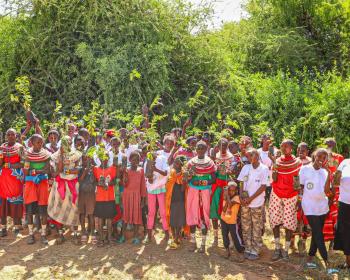Open Letter to the President of the Republic of Kenya, H.E Uhuru Kenyatta over the Situation in Laikipia
Dear Mr. President,
We at Cultural Survival appreciate your government’s continued effort and commitment in facilitating peace in Northern Kenya.
As an international organization that stands with Indigenous communities around the world, we hereby write to you today in regard to the on-going land “invasion” crisis in Laikipia County.
The confrontation between Samburu, Maasai and Pokot herders in the last six months is getting out of control, leading to the death of dozens of people.
The herders are on a desperate effort to keep their livestock alive during a deadly drought that you as the President of the republic declared a national emergency.
Mr. President, your government’s response to the crisis is use the police to drive the herders out of the ranches instead of looking at crisis one of compassion for a distressed people. Your government has shown total bias in support of white ranchers. The operation has hurt a lot of people - homes have been burnt down, livestock confiscated from an already vulnerable community and serious violations of human rights by the police.
Mr. President, we also authoritatively inform you that there are operatives in your government who are not interested in long term solutions to the current crisis but rather looking at short term gains like control of Laikipia North Parliamentary seat. There are also claims that people in your government are interested in some of the ranches that are being claimed by the Maasai and Samburu.
We are also concerned by the deliberate media onslaught that is branding pastoralists as “Invaders, Marauders and Criminals.” The campaign is being waged by people in your government and white ranchers. We feel that mudslinging these communities that are on the verge of a serious economic depression due to effects of climate change is unfair. This campaign is dividing the country and portraying the pastoralists as the “other” and not a victim of drought.
Mr. President, we would like to reiterate again that the migration of pastoralists into Laikipia is not a mindless movement. The problem boils down to land fragmentation. Large scale ranches, agriculture and protected areas have taken away or blocked access to remaining historical grazing lands, resulting in negative impacts on the pastoralist production system. Pastoralists who have traditionally dependent on access to communally-held seasonal grazing areas and water sources have been cut off thus the current spate of forceful entrance into the ranches.
Mr. President, we do not condone any form of violence by any of the parties. We seek your understanding of the fact that this pastoral system has been broken by land fragmentation, and this factor cannot be ignored in this conflict.
We must also put this in the perspective of historic land injustices meted upon the Maasai and Samburu people in Laikipia where the bulk of their land was confiscated during the colonial era. Most of this land (937,583 hectares) or 40% is currently owned by 48 individuals as commercial ranches or conservancies. These ranches and farms are fenced off and rarely provide migration routes for pastoralists. Pastoralists are limited to 13 group ranches (7.45%) in the drier northern parts of the county.
Mr. President, we are concerned that your government has continued to show disinterest in resolving historical land injustices in Laikipia or provide support to the Maasai and Samburu to cushion them against the current drought crisis. As a result, a majority is becoming poorer as the land use system is not beneficial to them. Unless addressed, this crisis will continue to intensify as time goes by.
Mr. President, we ask you to do the following:
- Address the long overdue issue of historical land injustices in Laikipia through a legislative process.
- Lead a process that will guarantee pastoralists migratory routes and passage to seasonal grazing areas and water sources.
- Stop the rampant police harassment, illegal arrests and extortion from pastoralists by the police. These abuses also need to be investigated by the Independent Police Oversight Authority.
- Implement long-lasting programs that will cushion pastoralist from the effects of prolonged drought and climate change.
Regards,
Cultural Survival



